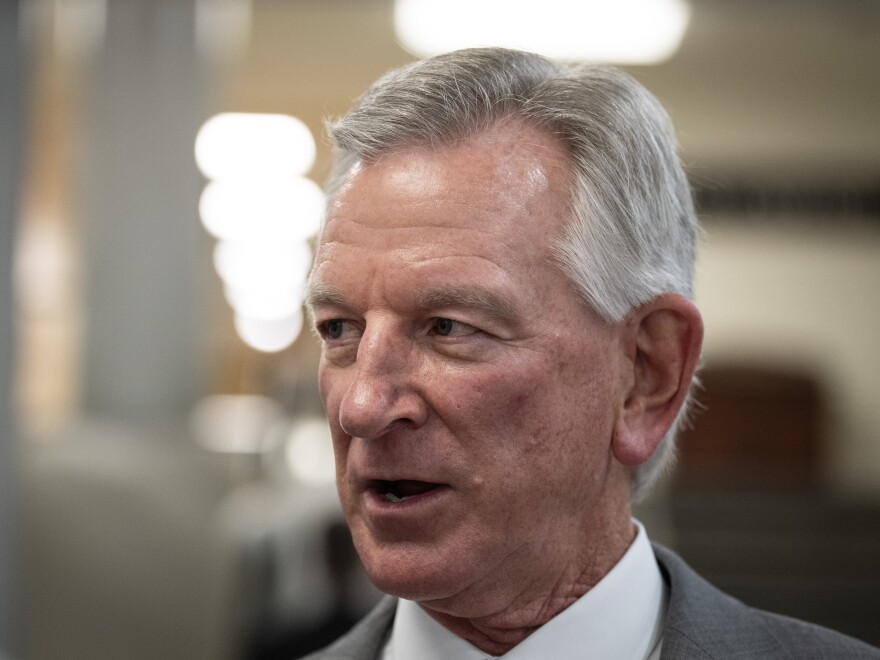Updated July 11, 2023 at 1:59 PM ET
The U.S. Marine Corps is operating without a Senate-confirmed commandant for the first time in over 150 years because one Republican, Sen. Tommy Tuberville, continues to block military officer nominations.
The position of Marine Corps commandant, the branch's highest-ranking officer, was vacated on Monday as Gen. David Berger retired after 42 years in the service.
Marine Corps Gen. Eric Smith, the current assistant commandant, was nominated to replace him, but is facing a Senate confirmation delay thanks to a procedural move from the Alabama senator.
Tuberville, a member of the Senate Armed Services Committee, has refused to confirm officer positions since the start of this year, citing his disapproval of the Pentagon's 2022 decision to support service members and their families in traveling out of state to receive an abortion.
Smith will remain in his title as assistant but will effectively take over the commandant's duties, performing both roles until he can be confirmed by the Senate, Defense Department spokesperson Sabrina Singh told reporters on Monday.
She added that Smith's confirmation is one of roughly 265 officer nominations that've been delayed by the Alabama senator.
The Pentagon says the delays are leaving a "huge impact"
The delayed confirmation marks the first time the Marine Corps has been without a Senate-confirmed commandant since the death of then-Commandant Archibald Henderson in 1859.
The role oversees the Marine Corps as its highest-ranking officer, a four-star general and a member of the Joint Chiefs of Staff.
Smith will have most of the authorities he needs to fill the role, but may struggle without a second-in-command, his predecessor told CNN.
"He can't do both jobs at the same time," Berger said in an interview on Monday. "So he's going to have to do his job in a very different way than I was able to, because I could travel, he was here, he could travel, I was here."
In a Defense Department statement, Secretary Lloyd Austin said that "smooth and timely transitions" are central to "the full strength of the most powerful fighting force in history."
Department spokesperson Singh later told reporters that the hold is leaving a "huge impact" across the force. Some officers are being asked to delay their retirement, to assume higher duties without higher pay or to force their families into logistical nightmares as they remain in relocation limbo, she said.
"I've heard cases of two students who were dis-enrolled from their current school because they were supposed to move with their family [...] now they can't enroll in a new school because they don't know when they'll be able to relocate," Singh said. In another case, a spouse ended her job contract with one employer but has been unable to start her next job.
Bigger concerns about the impact on national security were on display Tuesday, as the Armed Services Committee held a nomination hearing for Air Force Gen. Charles Q. Brown Jr.
Brown has been nominated as the next chairman of the Joint Chiefs of Staff. The current chairman, Gen. Mark Milley is set to step down this year as he reaches his term limit.
When asked by Sen. Elizabeth Warren, D-Mass., during the hearing to comment on the impact of Tuberville's protest, Brown mentioned the risk to retention efforts at a time when the military has seen a decline in recruitment.
"Our more junior officers will now look up and say, 'if that's the challenge that I'm going to have to deal with in the future, I'm going to find balance between my family and serving in a senior position'," Brown said. "We will lose talent because of those challenges."
In an interview with CNN on Monday, Tuberville implied that Brown would be confirmed separately to the other nominations.
"He's going to go through confirmation tomorrow, and we will vote on him by itself. He will not be held up," he said. Absent that confirmation, Adm. Christopher Grady would step up in a "performing the duties of" capacity, the Pentagon said.
Tuberville claims the military is falling prey to left-leaning ideology
In the 14-minute conversation with host Kaitlan Collins, Tuberville defended his actions, saying "if I thought it was hurting readiness or recruiting, I wouldn't be doing this."
When asked if he thought he knew more about military readiness than former defense secretaries who've criticized him, he responded: "They weren't elected. I was elected to represent the people of Alabama in this country."
The Pentagon has previously defended its abortion travel policy, saying that service members and their families are often sent to live in locations they may not otherwise choose but should still have access to reproductive care of their choosing.
Tuberville opposes the policy because he believes it uses taxpayer money to fund abortions, in violation of a federal policy known as the Hyde Amendment that prohibits the use of federal funds for abortion except in cases of rape, incest or when the mother's life is at risk. The Pentagon says it only funds travel, not the procedure itself.
But for Tuberville, the policy is just the latest evidence supporting his wider claim that the military is under attack from left-leaning political forces.
He's spoken out against fresh efforts to root out extremism within the military and accused Defense leaders of teaching critical race theory, which Secretary Austin has rebutted.
If his hold continues, more than 650 officer roles could fall vacant by the end of the year, Singh said.
Copyright 2023 NPR. To see more, visit https://www.npr.org.


